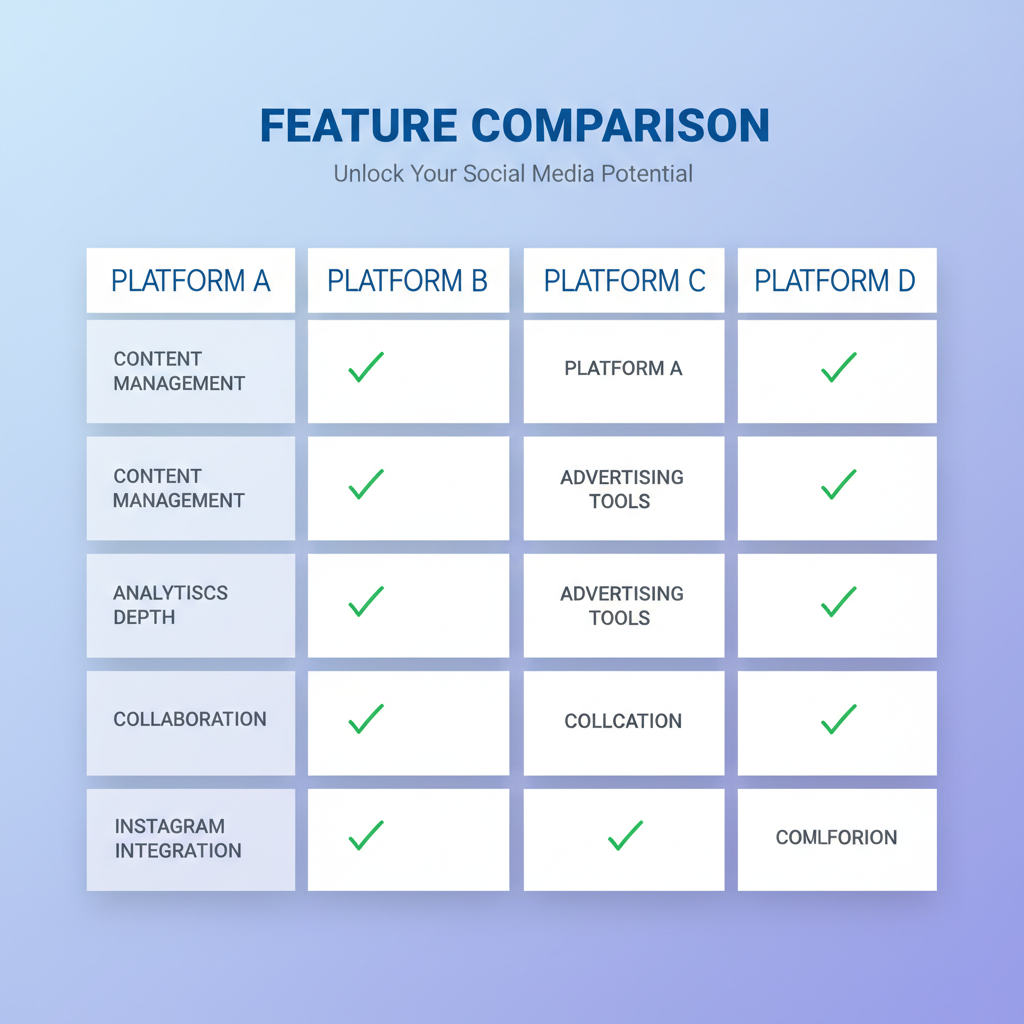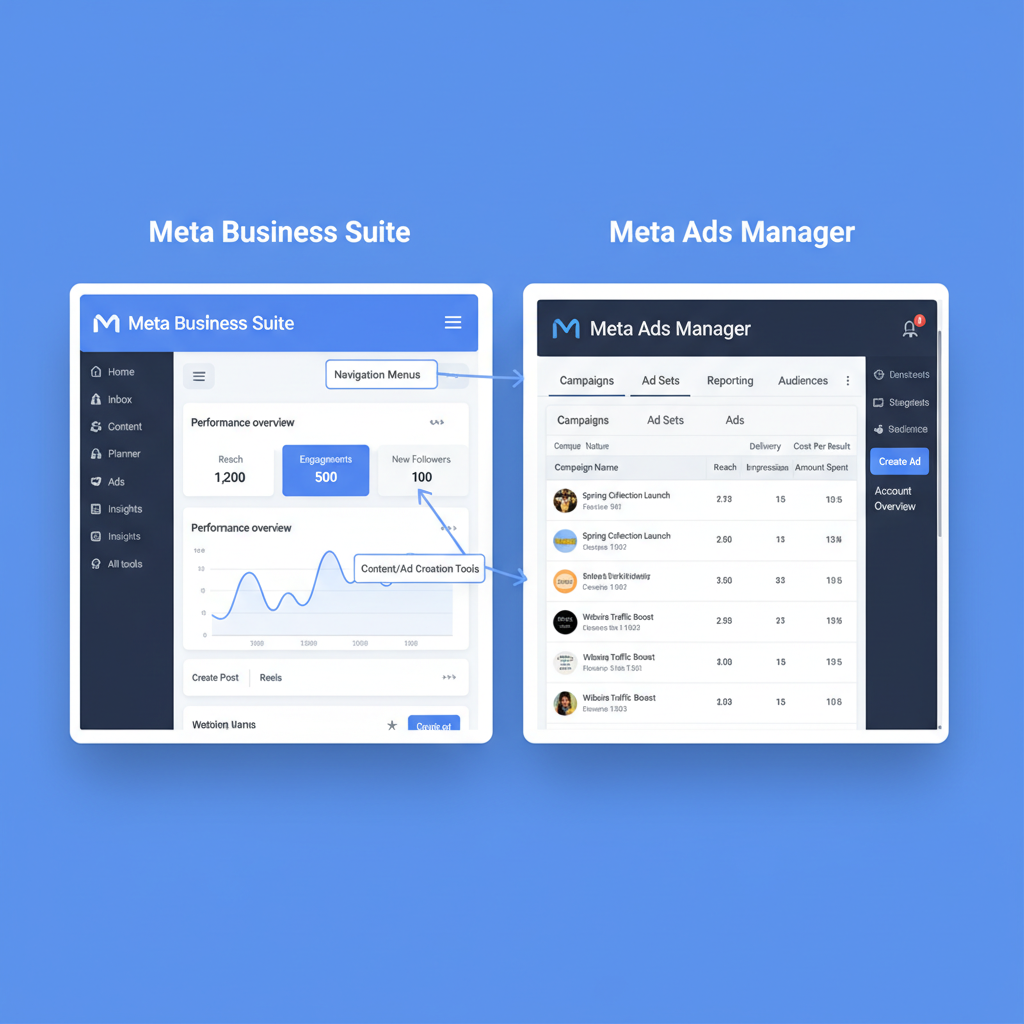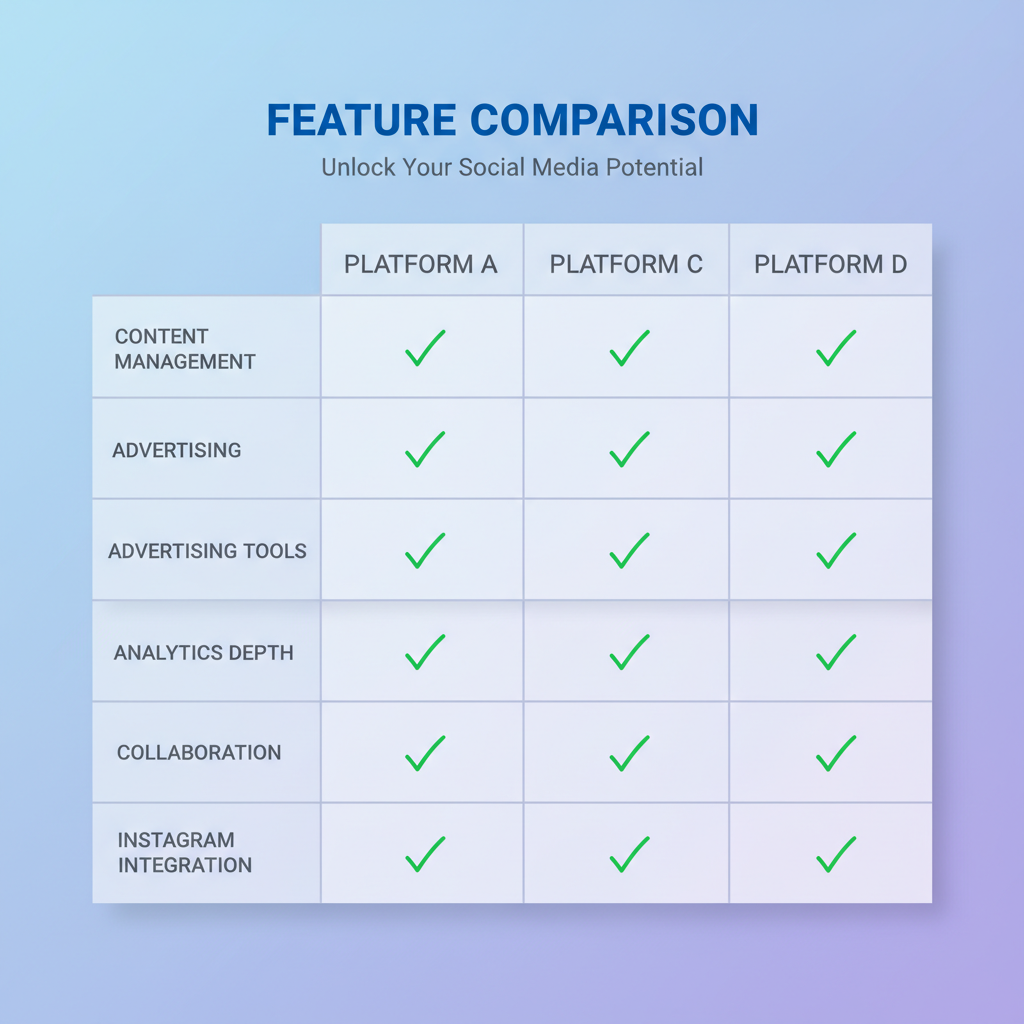Facebook Meta Business Suite vs Ads Manager Differences
Learn the key differences between Meta Business Suite and Ads Manager, from content management to advanced ad targeting, to choose the best tool.

Introduction to Meta Business Suite vs Ads Manager: Choosing the Right Meta Tool for Business Growth

In today’s fast-moving social media marketing environment, businesses using Facebook and Instagram depend heavily on Meta’s integrated platforms to grow their online presence, engage audiences, and drive conversions. Two popular tools often compared are Meta Business Suite and Ads Manager.
Both fall under the Meta ecosystem but offer distinct functionalities — one focusing on social content and light promotions, the other dedicated to advanced advertising and analytics. Understanding the Meta Business Suite vs Ads Manager comparison helps marketers, entrepreneurs, and agencies select the right tool or plan an effective workflow using both together.

In this comprehensive guide, we’ll break down each tool’s features, differences, and use cases to help you decide how to maximize their potential.
---
Overview of Meta Business Suite
Meta Business Suite is an all-in-one hub for managing both organic and paid activities across Facebook and Instagram. Its core purpose is to centralize essential marketing tasks so teams can work more efficiently in one place.
Purpose:
- Centralizes content creation, scheduling, community management, and basic ad boosting.
Key Features:
- Unified inbox for Facebook and Instagram messages and comments.
- Post creation and scheduling across both platforms.
- Basic insights on reach, engagement, and audience demographics.
- Simple, post-linked ad creation via boosting.
Target Users:
- Small to medium-sized businesses seeking simplicity.
- Social media managers focused primarily on content and engagement.
---
Overview of Ads Manager
Ads Manager serves as Meta’s primary platform for advanced advertising — giving marketers granular control over campaigns for highly targeted and measurable results.
Purpose:
- Enables robust ad creation, budget allocation, placement selection, and performance tracking.
Key Features:
- Multiple campaign objectives: Awareness, Consideration, Conversion.
- Detailed demographic, interest, and behavioral targeting.
- Split testing and creative A/B testing.
- In-depth analytics including ROAS, cost per conversion, and attribution analysis.
Target Users:
- Professional digital marketers, agencies, and businesses running significant ad budgets.
---
Core Differences: Dashboard and Interface
Meta Business Suite provides a unified, content-first dashboard combining organic and paid posts with simplified performance insights for easy navigation.
Ads Manager’s dashboard, by contrast, is built for data analysis — offering campaign, ad set, and ad views with customizable columns, advanced filters, and reporting tools.

If your focus is storytelling, publishing, and light ad boosting, Business Suite feels intuitive. For complex campaign structures, Ads Manager is built for the task.
---
Content Management vs Advertising Management
A key distinction lies in their primary focus:
- Meta Business Suite: Geared toward organic content creation, publishing consistency, engagement tracking, and lightweight advertising.
- Ads Manager: Geared toward paid advertising strategy, advanced audience targeting, campaign scaling, and conversion optimization — with little focus on organic posting.
---
Analytics and Reporting: Depth and Usability
The analytics available differ considerably:
- Business Suite Analytics: Offers high-level metrics such as reach, likes, comments, and shares — suitable for monitoring engagement trends over time.
- Ads Manager Reporting: Delivers precise ad performance data, from clicks and CPC to ROAS and conversion reporting, with exportable custom reports for deeper analysis.
Marketers analyzing customer journeys and return on investment will need Ads Manager.
---
Collaboration and Permissions Management
Meta Business Suite manages permissions at a Page or Business Account level, with predefined roles such as Admin, Editor, or Moderator — ideal for managing community interactions.
Ads Manager allows role assignment at an ad account or campaign level, with roles such as Analyst, Advertiser, or Admin to control budget and creative access.
---
Instagram Integration and Cross-Platform Scheduling
Both tools integrate Instagram, but their capabilities differ:
- Business Suite: Allows cross-platform scheduling and posting, making it possible to create one post for Facebook and Instagram while customizing captions.
- Ads Manager: Supports Instagram only for paid ad placements — no organic content scheduling.
---
Campaign Creation: Boosting vs Advanced Workflow
Meta Business Suite Boosting:
- Select an existing post.
- Click “Boost Post.”
- Choose audience, budget, and duration.
Ads Manager Campaign Creation:
- Choose a campaign objective.
- Create ad sets with detailed targeting, placements, budgets.
- Build multiple creatives within the same campaign.
- Track conversions using Pixel or Conversions API.
## Example: Campaign Objective in Ads Manager
- Select "Conversions"
- Choose Website or App
- Define custom audience (location, interest, behavior)
- Select placements (Facebook feed, Instagram stories, Audience Network)
- Set budget and bid strategy---
When to Use Meta Business Suite
Meta Business Suite is ideal for:
- Small businesses with limited ad spend.
- Brands prioritizing community engagement and organic presence.
- Teams needing posting automation without complex targeting.
Its simplicity allows for fast execution without a steep learning curve.
---
When to Use Ads Manager
Ads Manager is suited to:
- Brands running multiple campaigns targeting segmented or international audiences.
- Teams requiring precise budgeting and advanced audience definitions.
- Marketers conducting A/B tests for creative and copy optimization.
- ROI-focused strategies reliant on conversion data.
---
Pros and Cons Comparison
| Feature | Meta Business Suite | Ads Manager |
|---|---|---|
| Primary Focus | Organic content management + basic ads | Advanced advertising campaigns |
| User Interface | Simple, beginner-friendly | Complex, data-heavy |
| Analytics Depth | Basic metrics | Advanced reporting |
| Instagram Integration | Organic and paid | Paid only |
| Targeting Options | Basic audience selection | Highly granular targeting |
| Permissions Control | Basic role assignment | Detailed ad account permissions |
| Best For | Small businesses, content managers | Advertisers, agencies, large campaigns |
---
Best Practices for Combining Both Tools
Many brands succeed by using Meta Business Suite and Ads Manager side by side:
- Use Business Suite to plan and schedule organic posts and manage conversations.
- Use Ads Manager for structured, optimized ad campaigns targeting specific audiences.
Practical Tips:
- Plan your monthly editorial calendar in Business Suite.
- Leverage Ads Manager’s reports to refine targeting in boosted posts.
- Foster collaboration between community managers and performance marketers to align goals.
---
Conclusion and Next Steps
The decision between Meta Business Suite and Ads Manager is less about superiority and more about your marketing priorities.
- Opt for Meta Business Suite if you focus on comprehensive social management and easy ad boosting.
- Choose Ads Manager if you need advanced targeting, budget control, and ROI tracking.
Many high-performing businesses integrate both to create a balanced strategy combining strong organic content with data-driven advertising.
Next step: Audit your current social and ad workflows, identify gaps, and experiment with the strengths of each platform to maximize your Facebook and Instagram marketing success.



